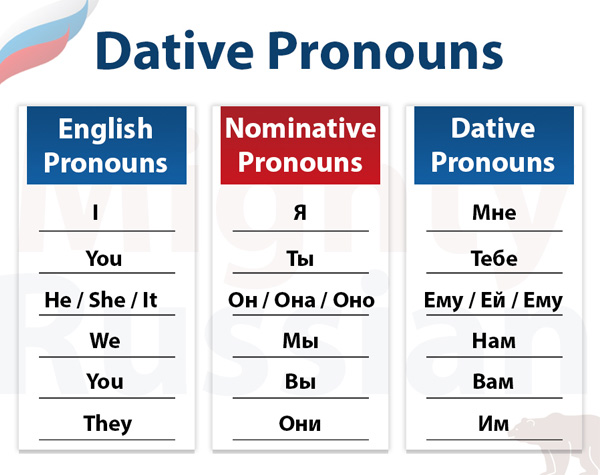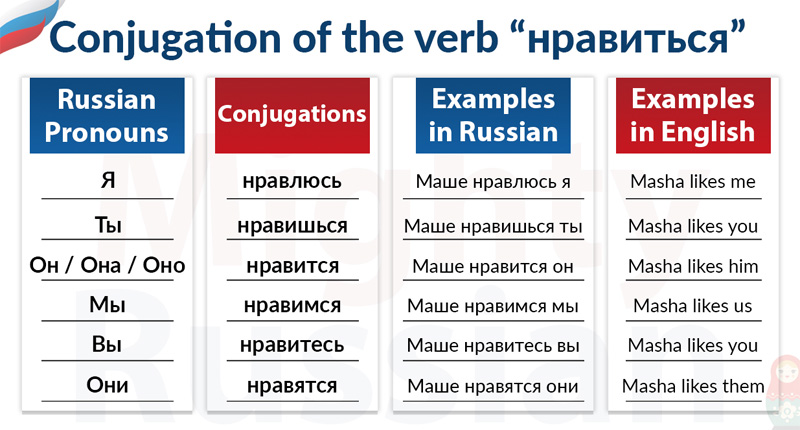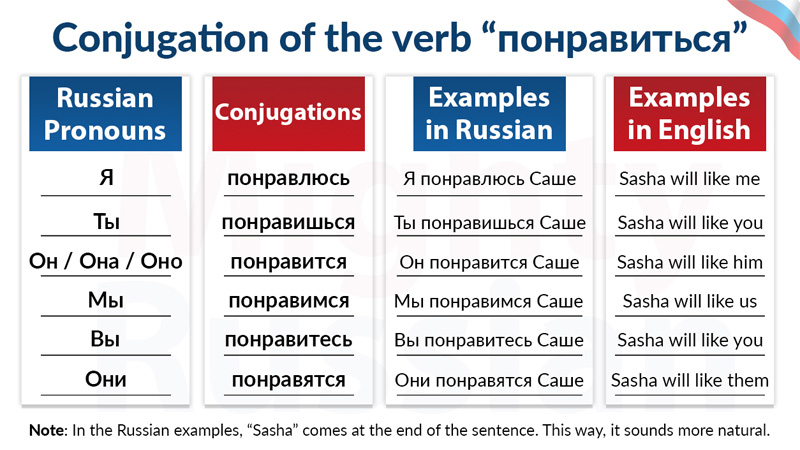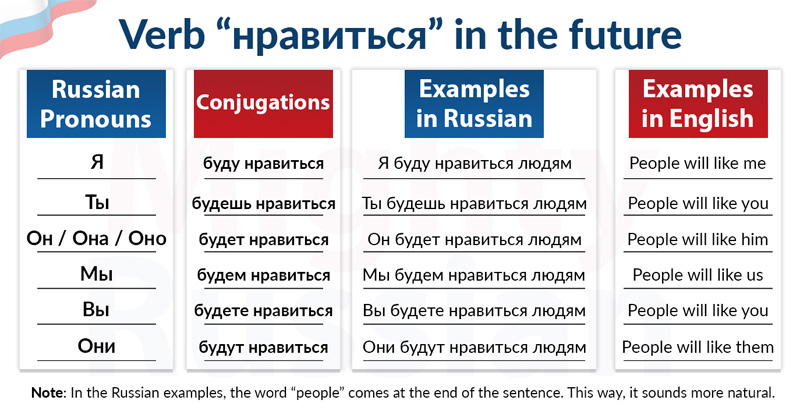Verb “нравиться” in Russian
The verb “нравиться” (“like” in English) is very common in Russian but can be very tricky for beginners. The way we use it in Russian is different from the way it’s used in English, so it may take some time until you learn all the nuances of its use.
In this lesson, you will learn all the possible ways to say “like” in Russian and, with a bit of practice, you will soon be able to use the verb “нравиться” confidently.
More specifically, I will teach you:
1) How to use the verb “нравиться” in the present;
2) How to use the verb “нравиться” in the past;
3) How to use the verb “нравиться” in the future;
4) How to make negative statements with the verb “нравиться”;
As you can see, the lesson will be very complete.
All the titles in blue have links, so if you already know some topic and would like to skip it, click on the title you’re interested in and go straight to it.
The verb “like / нравиться” in the present
The use of the verb “нравиться” is a little bit different from that of other Russian verbs.
In a sentence with this verb, the person that likes something is not used in the Nominative Case (я, ты, он, она, etc.). In other words, to say “I like”, you cannot use the pronoun “Я” + нравиться.
Instead, you have to use a noun or pronoun in the Dative Case. Here are all the Dative Pronouns:
I won’t get into details on how to use the Dative Case because I already made a complete lesson about it here at Mighty Russian. If you don’t know yet how to use this case, you can click here and check out our complete lesson about it.
Here is how you would form the first part of the sentence:
мне + нравиться (I like)
тебе + нравиться (you like)
ему + нравиться (he likes)
ей + нравиться (she likes)
нам + нравиться (we like)
вам + нравиться (you like)
им + нравиться (they like)
Моему другу + нравиться (My friend likes)
Моим братьям + нравиться (My brothers like)
But here comes the second tricky thing about the verb “нравиться”.
Verbs in Russian are normally conjugated according to the person who executes the action, which is the subject of the sentence (like in most languages).
Let’s take the verb “хотеть / want” as an example. You could say:
Я хочу чай (I want tea)
Ты хочешь чай (You want tea)
Он хочет чай (He wants tea)
As you can see, when the person (я, ты, он) changes, the ending of the verb changes as well.
When we conjugate the verb “нравиться”, however, its ending depends on the thing someone likes – not on the person who likes.
This is how this verb is conjugated:
Note that when you want to say that you like “something” (in the singular) or that you like “to do something”, you need to use the form “нравится“.
Let’s take a look at some examples.
I will highlight the thing which is liked in red. Try to pay attention to the way the verb changes depending on the highlighted word.
Мне нравится чай (I like tea)
Ему нравятся машины (He likes cars)
Тебе нравимся мы? (Do you like us?)
Мне нравится играть в игры (I like playing games)
Мне нравишься ты (I like you)
Им нравится изучать языки (They like learning languages)
Now, if you don’t know how to use the Dative Case yet, start by learning how to use the verb “нравиться” with Dative Pronouns.
You won’t be able to make all types of sentences, but it will be a great start.
The verb “нравиться” in the past
To say “like” in the past in Russian, we use two verbs: “нравиться” and “понравиться”.
Let’s first understand when each of these verbs is used and then take a look at how we can make sentences with them.
The verb “нравиться” is imperfective.
That means you will use “нравиться” when someone liked something over a period of time in the past. Basically, you are saying that “someone used to like something” or “was liking something”.
The verb “понравиться” is perfective.
When you use this verb, you’re saying that “someone liked something” in a specific situation.
Let me give you some examples in English first so it gets easier to understand the difference.
I always liked music (Мне всегда нравилась музыка)
I really liked the song you sent to me (Мне очень понравилась песня, которую ты мне отправил)
As you can see, in the first sentence, the person liked music for a period of time in the past. The word “always” makes that clear to us.
In the second example, however, the person listened to the song in a specific situation and liked it. It happened on a single occasion. It didn’t happen for a period of time.
I know this can be hard at the beginning, but with time and practice everything will get easier.
We have already made a full lesson about the Imperfective and Perfective Aspects of the Russian verbs. If this subject is new to you, you can check out our lesson later clicking here.
Now that you know how to use the verb “нравиться” in the present, making sentences in the past will be very simple because the logic is exactly the same.
The ending of the verb will still depend on the thing the person likes – not on the person who likes. Exactly like in the present.
But now, you will have four different forms for the verb “нравиться” and four for the verb “понравиться”.
01) “Нравился” and “понравился” are used when the gender of the thing you like is masculine.
Им нравился этот актёр (They used to like this actor)
Нам понравился матч (We liked the match)
02) “Нравилась” and “понравилась” are used when the gender of the thing you like is feminine.
Мне нравилась физика в школе (I liked physics at school)
Моим детям понравилась поездка (My kids liked the trip)
03) “Нравилось” and “понравилось” are used when the gender of the thing you like is neuter.
Мне нравилось мясо (I used to like meat)
Ей понравилось синее платье (She liked the blue dress)
04) “Нравились” and “понравились” are used when the thing you like is in the plural, regardless of the gender.
Раньше ему нравились романы (He used to like novels)
Мне понравились твои джинсы (I liked your jeans)
Note that the person that likes something is in the Dative Case.
I highlighted the verb “нравиться” in blue. As you can see, when this verb is used, the action happens for a period of time in the past.
The verb “понравиться” is highlighted in red. When this verb is used, it is clear that someone liked something on a single occasion.
The verb “нравиться” in the future
In Russian, to say “like” in the future, we will again need two verbs “нравиться” and “понравиться”.
Let’s first take a look at when each of these verbs is used and then how we can make sentences with them.
The verb “нравиться” is seldom used in the future because it literally implies that “someone will be liking something” or that someone will like something for a period of time in the future.
That doesn’t mean you will never hear it, though.
In sentences like “He will like going to work when he buys a car”, for example, you would use the verb “нравиться” because it’s something that will happen continuously in the future.
The verb “понравиться”, on the other hand, is used much more often.
It is used to say that “someone will like something” in a specific situation or on a single occasion.
Let’s take a look at how these verbs are conjugated:
For example:
Тебе понравится поездка в США (You will like visiting the USA)
Моему другу понравится ресторан (My friend will like the restaurant)
Я надеюсь, что тебе понравится этот фильм (I hope you will like this movie)
Note that the most common form of the verb “понравиться” is “понравится”, the 3rd person singular.
For example:
Ей будет нравиться жить в США (She will like living in the United States)
Она будет всем нравиться (Everyone will like her)
Тебе всегда будет нравиться твоя работа (You will always like your job)
Keep in mind that in all the examples, the use of the verb “нравиться” indicates that the action will happen for a period of time in the future.
If you want to say that the action will happen on a single occasion, use the verb “понравиться” instead of “нравиться”.
Again, if the choice of the verb is difficult for you, make sure to check out our lesson on the Imperfective and Perfective Aspects of the Russian language.
It’s also worth noting that you will use the Dative Case for “the person that likes” in the future tense as well.
Negative statements with the verb “нравиться”
To say that “someone doesn’t like something” in Russian is very simple.
All you have to do is use the word “не” before the verb “нравиться” or “понравиться” in the present, past or future.
For example:
Мне не нравится готовить (I don’t like cooking)
Ему не понравилась моя новая машина (He didn’t like my new car)
Моей жене не понравился ресторан (My wife didn’t like the restaurant)
Я думаю, что им не понравится поездка (I think they won’t like the trip)
Ей не нравится ходить в кино (She doesn’t like going to the movie theater)
Моему сыну никогда не нравились кошки (My son never liked cats)
All the rules that you have to follow are the ones that we have learnt in this lesson.
And that’s all guys! Now you know how to say “like” in Russian in all the possible ways.
If you have any questions, just leave them in the comments. I will be happy to help you!















